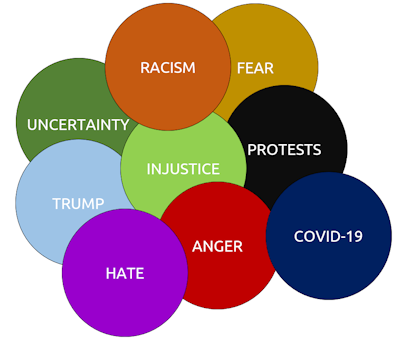Constructive Confrontation
by
September, 2020
The highly escalated, increasingly dehumanized, and deeply intractable nature of today's big (and little) conflicts threaten pretty much anything that we have ever really cared about. By 2018 (and probably earlier) in the United States and far too many other places, these conflicts had reached the point where many people concluded that compromise was no longer a realistic option. They felt that, like it or not, they were involved in a win-lose confrontation that they simply could not afford to lose. This is even more true in fall 2020, coming up on the November U.S. elections. As Guy pointed out in his recent blog post, neither side is willing to contemplate losing and as a result, their actions are driving the current escalation spiral higher and higher.
Back in February, 2018, we started a new MBI project focused on bringing together what we knew about how to make the apparently inevitable confrontations between liberals and conservatives as constructive as possible. This focus on what we called "constructive confrontation" was a significant departure from the work of many of our colleagues were doing as they pursued more traditional goals such as conflict resolution, compromise, and peacebuilding.
| Most people see themselves as advocates on one side or the other of a conflict, not as neutral intermediaries who, by implication, see the validity of arguments on all sides of an issue. Such advocates tend to be distrustful of "conflict resolution." |
This "reframing" reflected a lesson that we learned early in the history of our Conflict Information Consortium program. Most people see themselves as advocates on one side or the other of a conflict, not as neutral intermediaries who, by implication, see the validity of arguments on all sides of an issue. Such advocates tend to be distrustful of "conflict resolution." They worry, for example, about being pressured to make unwanted compromises or, in the event they do decide to compromise, about being double-crossed. Back in the early 1990s, we also learned that these same people tended to be deeply aware of the dangers of all-out confrontation and were very interested in limiting the destructiveness that they knew commonly accompanied their advocacy efforts. So the original Constructive Confrontation Project was designed to show how applying a more sophisticated understanding of conflict dynamics could help advocates better defend and advance their interests. For example, conflict resolution skills are critical to building and maintaining strong alliances. Plus, the ability to empathize with your adversary allows you to more accurately identify how you might persuade them to agree to at least some of your wishes. Such empathy also helps identify the things that you may be doing that provoke unnecessary opposition. (Successful advocates don't make their adversaries any madder at them than they have to.)
We, of course, also wanted to show those interested in taking on "third side" roles how they could make critically-important contributions to deescalating our countries' and the world's "big problems" and we wanted to explore with professional colleagues how we can improve what our field offers to partisan advocates, as well as third parties.
In 2019, we followed this initiative with the Constructive Conflict Initiative. The materials in the earlier Constructive Confrontation Project very much relate to the ideas were are pursuing in the Constructive Conflict Initiative because both efforts seek to help people learn to approach their difficult conflicts in constructive ways. The insights of the Constructive Confrontation Initiative, for example, are absolutely essential for addressing current (2020) struggles around topics such as racism, climate, and COVID.
| We are now expanding the original collection of Constructive Confrontation materials in an effort to show advocates how they can more constructively confront issues they care about, without creating such a strong backlash that they either fail to achieve their goals, or, as sometimes happens, fall backwards due to the strength of their opposition. |
Given this, we are now expanding the original collection of Constructive Confrontation materials in an effort to show advocates how they can more constructively confront issues they care about, without creating such a strong backlash that they either fail to achieve their goals, or, as sometimes happens, fall backwards due to the strength of their opposition.
Given the intensity of many ongoing conflicts, it's clear that the continuation of "business-as-usual" approaches will yield a continuation of "destruction-as-usual" outcomes, with many trend lines pointing toward real catastrophe. The alternative is not an unrealistic grand compromise, but the promotion of much more constructive confrontation skills—the kind that harness conflict as an engine of social learning—one that helps produce a wiser and more equitable society over the long term.
The new Constructive Conflict Project page has an introduction very similar to this essay, but continues with links to many articles and videos on:








